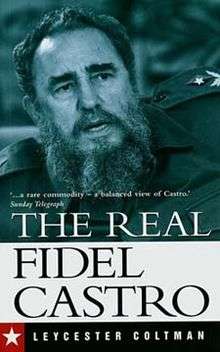The Real Fidel Castro
The Real Fidel Castro is a biography of the Cuban revolutionary and politician Fidel Castro, written by the British diplomat Sir Leycester Coltman (1938–2003) and first published by Yale University Press in 2003. A diplomat for the government of the United Kingdom, Coltman had been appointed to the position of British ambassador to Cuba from 1991 through to 1994, during which time he got to know Castro personally. He died shortly before his biography's publication.
 The first edition cover of the book. | |
| Author | Leycster Coltman |
|---|---|
| Country | United States |
| Language | English |
| Subject | Biography |
| Publisher | Yale University Press |
Publication date | 2003 |
| Media type | Print (Hardcover & Paperback) |
The biography looks at Castro's life from its beginning up until the start of the 21st century, when Castro was in his final years of the presidency, a position that he would relinquish in 2008. The book is accompanied by anecdotes about Castro and his relationship with other politicians, supplied by Coltman from his years in the diplomatic service.
The Real Fidel Castro was reviewed in the mainstream press in both the United Kingdom and United States.
Background
Synopsis
Reception
U.K. press reviews
Richard Gott, in the New Statesman[1]
In a review published in the British magazine New Statesman, the journalist and historian Richard Gott noted that Coltman "has a good eye for detail and the telling anecdote" but at the same time, Gott felt that he "devotes rather too much space to Castro's early life, galloping though the 1990s about which his personal experience and insights might have been better deployed at greater length." Believing that the "stock-in-trade" of diplomats like Coltman was gossip, Gott felt that Coltman's work "repeats more stories about the love-lives of senior revolutionaries than I found interesting".[1] Gott went on to compare Coltman's biography with one published around the same time, written by the German reporter Volker Skierka; he notes that "For the first time, we now have two full-length studies of the Cuban leader that reflect a European view. It makes a salutary change, and both diplomat and reporter have original things to say. Coltman's book is more measured, Skierka's more timely, yet neither strays far outside their specialist expertise."[1]
References
Footnotes
Bibliography
- Coltman, Leycester (2003). The Real Fidel Castro. New Haven and London: Yale University Press. ISBN 978-0-300-10760-9.
- Gott, Richard (9 February 2004). "Larger than life. Fidel Castro is a liberal utopian of the 19th century rather than a 20th-century totalitarian. He has moved with the times and, thanks to him, Cuba has been spared the neo-liberal chaos that engulfed the former Soviet bloc". New Statesman. London. Retrieved December 2011. Check date values in:
|accessdate=(help)